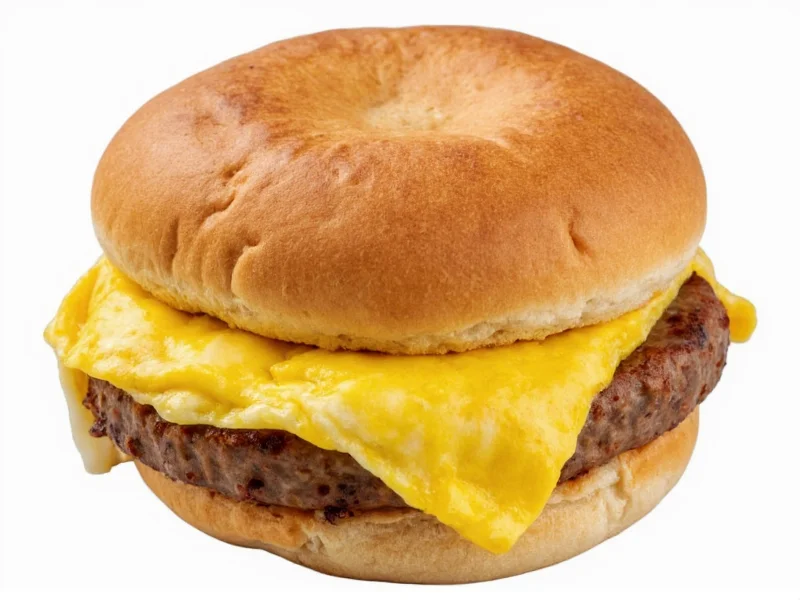If you're monitoring your daily calorie intake, understanding the complete nutritional profile of McDonald's Sausage Egg McMuffin is essential for making informed dietary choices. This breakfast option remains one of McDonald's most popular morning menu items, but its nutritional content warrants careful consideration for those tracking their dietary intake.
| Nutrient | Amount | % Daily Value* |
|---|---|---|
| Calories | 480 | 24% |
| Total Fat | 30g | 38% |
| Saturated Fat | 11g | 55% |
| Trans Fat | 0.5g | - |
| Cholesterol | 290mg | 97% |
| Sodium | 900mg | 39% |
| Total Carbohydrates | 35g | 13% |
| Dietary Fiber | 2g | 7% |
| Sugars | 2g | - |
| Protein | 23g | - |
*Percent Daily Values are based on a 2,000 calorie diet. Your daily values may be higher or lower depending on your calorie needs.
Understanding the Nutritional Profile
The Sausage Egg McMuffin's 480 calories come primarily from its protein and fat content. With 23 grams of protein, this sandwich provides substantial protein that can help with satiety throughout the morning. However, the 30 grams of total fat, including 11 grams of saturated fat, represents a significant portion of recommended daily limits.
For context, the American Heart Association recommends limiting saturated fat to no more than 13 grams per day for a 2,000-calorie diet. The Sausage Egg McMuffin alone provides nearly 85% of this recommended limit. The 900mg of sodium also represents 39% of the recommended daily maximum of 2,300mg.
How It Compares to Other Breakfast Options
When evaluating calories in egg mcmuffin with sausage against other McDonald's breakfast items, the nutritional profile becomes clearer:
- Regular Egg McMuffin (without sausage): 300 calories
- Bacon, Egg & Cheese Biscuit: 460 calories
- Sausage McGriddle: 550 calories
- Hash Browns: 140 calories
The addition of sausage increases the calorie count by 180 calories compared to the standard Egg McMuffin. This difference primarily comes from the sausage patty, which adds approximately 180 calories, 15 grams of fat, and 520mg of sodium to the sandwich.
Dietary Considerations for Different Goals
For those tracking egg mcmuffin with sausage nutrition facts for weight management, this sandwich represents about 24% of a standard 2,000-calorie daily intake. Individuals following a 1,500-calorie weight loss plan would consume nearly one-third of their daily calories with this single meal.
If you're concerned about how many calories in egg mcmuffin with sausage fit into a heart-healthy diet, the high saturated fat and sodium content warrant attention. The 290mg of cholesterol (97% of daily value) may be problematic for individuals with cholesterol concerns.
For those seeking is egg mcmuffin with sausage healthy alternatives at McDonald's, consider these modifications:
- Order the standard Egg McMuffin without sausage (300 calories)
- Request no cheese to reduce calories and fat
- Add a side of fruit instead of hash browns or pancakes
- Pair with black coffee or water instead of sugary beverages
Putting Calories in Context
While the 480 calories in a Sausage Egg McMuffin might seem high, it's important to consider the complete nutritional picture. The 23g of protein provides substantial nutritional value that can help maintain muscle mass and promote fullness. For active individuals or those with higher caloric needs, this sandwich can be part of a balanced diet when consumed occasionally.
Nutritionists generally recommend that breakfast provide 300-500 calories for most adults, making the Sausage Egg McMuffin appropriate in terms of total calories for a morning meal. The concern lies primarily in the quality of those calories - specifically the high saturated fat and sodium content.
Practical Tips for Mindful Consumption
If you enjoy calories in mcdonald's breakfast sandwich with egg and sausage but want to make smarter choices:
- Consider sharing the sandwich with someone to reduce portion size
- Eat slowly to enhance satiety signals and prevent overeating later
- Balance with lighter meals later in the day
- Check McDonald's mobile app for regional variations that might have different nutritional profiles
- Be aware that preparation methods can vary slightly by location, potentially affecting egg mcmuffin with sausage calorie count
Frequently Asked Questions
How many calories are in a McDonald's Sausage Egg McMuffin without cheese?
Removing the cheese from a Sausage Egg McMuffin reduces the calorie count to approximately 430 calories. You'll also save about 60mg of cholesterol and 3g of fat compared to the standard version with cheese.
Is the Sausage Egg McMuffin a good source of protein?
Yes, with 23 grams of protein, the Sausage Egg McMuffin provides a substantial protein source that can help maintain muscle mass and promote satiety. This represents about 46% of the recommended daily protein intake for a 2,000-calorie diet.
How does the Sausage Egg McMuffin compare to homemade breakfast sandwiches?
Homemade versions typically contain fewer calories and less sodium. A homemade sausage egg sandwich made with whole grain bread, one egg, and a standard sausage patty usually ranges from 350-400 calories with significantly less sodium than the McDonald's version's 900mg.
Does the calorie count differ by location?
The standard Sausage Egg McMuffin contains 480 calories in the United States. International locations may have slightly different formulations that affect the calorie count, but McDonald's maintains relatively consistent nutrition profiles across North American locations.
What's the best way to reduce calories in a Sausage Egg McMuffin?
To reduce calories, order it without cheese (saves 50 calories) or without the English muffin (saves 140 calories). You could also request just one egg instead of the standard preparation. The most significant calorie reduction comes from ordering the standard Egg McMuffin without sausage, which contains 300 calories.











 浙公网安备
33010002000092号
浙公网安备
33010002000092号 浙B2-20120091-4
浙B2-20120091-4